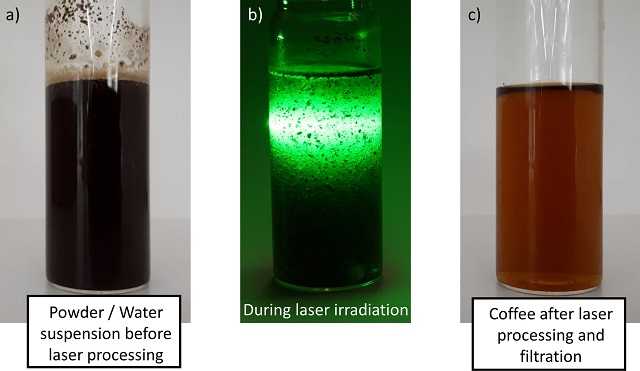MILAN – Researchers from the University of Duisburg Essen in Germany have created a laser-powered extraction system that pumps out cold brew about 300 times faster than traditional methods. The research was described in a paper published in the journal Nature. Previously, a team of researchers mostly from China used ultrasound to decrease cold brewing time from 12 hours to 1 hour. With this new method, cold brew time could be reduced to merely three minutes using lasers.
The technique is derived from the laser synthesis and processing of colloids (LSPC) field, a method typically used to blast apart metal solids in solvent solutions and create solutions of suspended nanoparticles.
To prevent overheating, the researchers took a neodymium-doped yttrium aluminum garnet (Nd:YAG) laser, tuned to 532 nanometers, and created 125-picojoule pulses lasting just 10 picoseconds.
They pulsed it through a solution of ground coffee mixed in with water, some 80,000 times per second, for three minutes, never raising the temperature by more than a few degrees.
Using liquid chromatography coupled to mass spectrometry, a technique which identifies molecules, the researchers showed that laser-pulsed coffee was similar to cold brew, allaying concerns that lasers might destroy the coffee.
The whole process can be seen in this time-lapse video.
The acidity was comparable to cold brewed coffee and lower than hot coffee. The caffeine content was less than cold brew but greater than hot brew.
The important aromatic trigonelline was highest in the cold-brew, lowest in the hot-brew, and somewhere in between in the laser coffee. No substances were found in the laser coffee that weren’t already in the hot or cold brews.
Other volatile aromatic compounds like pyridine and diphenolwere were present only in the cold-brew and laser-brew – they evaporate off when you make a hot coffee, contributing to that gorgeous hot-brew smell but disappearing from the flavor profile.
“In summary,” reads the study published in the journal Nature, “we recorded a similar [chemical] profile for all coffee variants. […] The chemical composition of ps-laser-extracted coffee is very similar to conventional cold-brew coffee.”
The research paper is open access in the journal Nature.


















